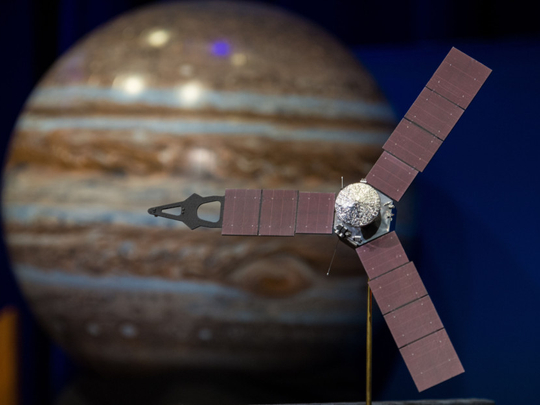
It took Nasa’s spacecraft Juno five years, hurtling through space at 125,000 miles an hour (201,168km/hr), to reach Jupiter, long dubbed the King of Planets, on July 4 — America’s Independence Day. As the basketball court-sized probe slipped into orbit, scientists at the Jet Propulsion Laboratory in Pasadena, California, eased off their computer screens for a moment, before it began to peer inside the atmosphere of a planet whose ponderous expanse would contain 1,400 Earths.
So what’s the big deal? Why the hype on the front pages of national newspapers in the United States?
“Jupiter is a mystery wrapped in an enigma — its raging surface storms and its hidden core remain largely unknown to science. It was the first planet in our solar system to coalesce out of a cloud of dust and gas after the birth of the sun, more than four billion years ago. Learning more about the strange planet could help us understand the building blocks of life on our own planet and beyond”, wrote Rachel Feltman in a lead story on the front page of the Washington Post the following day.
Still, that begs the question about the ‘why’ of it. Why put in five years, spend $1.2 billion (Dh4.41 billion) and travel 534 million miles just to touch base with a planet that epitomises bad real estate, bitter cold and gargantuan storms, blowing at up to 330 miles per hour? “Over the coming year, scientists expect to answer countless questions about the massive world of Jupiter”, added Feltman in her report,” including questions no one has yet thought to ask”. That should do it — asking questions that have not yet been asked, giving free reign to our intellectual inquisitiveness and, like those who pursue art for art’s sake, seeking knowledge purely for the sake of knowledge. It is axiomatic among sociologists — including one of our own, the Arab historiographer Ibn Khaldun, who wrote his seminal work, Muqaddimah in the 1370s — that a culture imbued with intellectual inquisitiveness is likely to find itself thrust beyond its fixed meaning, enriched and energised.
Conversely, a culture that is cursed by intellectual lassitude, or that feels threatened by innovation, will find itself moving around the treadmill of immemorially posited norms, repeating itself from generation to generation, left by the wayside in the global dialogue of cultures.
Intellectual inquisitiveness (Khaldun called it “assabiyah”) is the lifeblood of a vibrant culture and a creative community. How can one not be enriched by seeking answers to questions that have not yet been asked, by contemplating the wondrous mysteries of the cosmos, of eternity, of life itself and asking why? Millions saw the apple fall, but Newton chose to ask why; and while millions sank into their bathtubs and never asked why the water ran over the edge, Archimedes did and jumped out naked, crying “eureka” at the joy of having discovered something new. Oh, the lyrical elan of a new discovery!
And that is why classical Arabs, the Arabs Khaldun wrote about — a trans-national, trans-racial, trans-cultural community of peoples inhabiting a land mass that stretched from the Indian Subcontinent to the Iberian Peninsula — were not afraid to appropriate knowledge from Greece, Persia and, as we read in the Hadith, “even China”, that distant land in the Orient — distant, that is, before our world contracted into Marshall McLuhan’s “global village”, many centuries later. And what they appropriated they mastered and transformed to their own measure, with the proud intent of surpassing it.
Thus, words — learned, argumentative, powerful, adversarial and lyrical — poured from their pens. And though many, perhaps a majority, were not ethnic Arabs, they were part of Arab civilisation and wrote in Arabic, which then had the status that English has today and Latin had in the Renaissance.
That was classical Arabs. Modern day Arabs? Not so much. And several United Nations-sponsored Arab Human Development Reports (the last one released in 2009), compiled by leading Arab scholars, attest to that. Are we working on the problem though, defying the jeering totem in our history, clawing our way to the top of the rock? Ask the new generation.
And, yes, Jupiter today, the cosmos tomorrow. Juno orbiting the King of Planets is a watershed moment in the history of astronomy, brought about by a combination of human curiosity, intelligence and enterprise, a testimony to the unabashed zest of American science, that body of facts and theories first systematised by the Greeks, revitalised by the Renaissance and now revolutionised by America; so revolutionised that it has taken us, well, where no man has gone before.
Fawaz Turki is a journalist, lecturer and author based in Washington. He is the author of The Disinherited: Journal of a Palestinian Exile.








